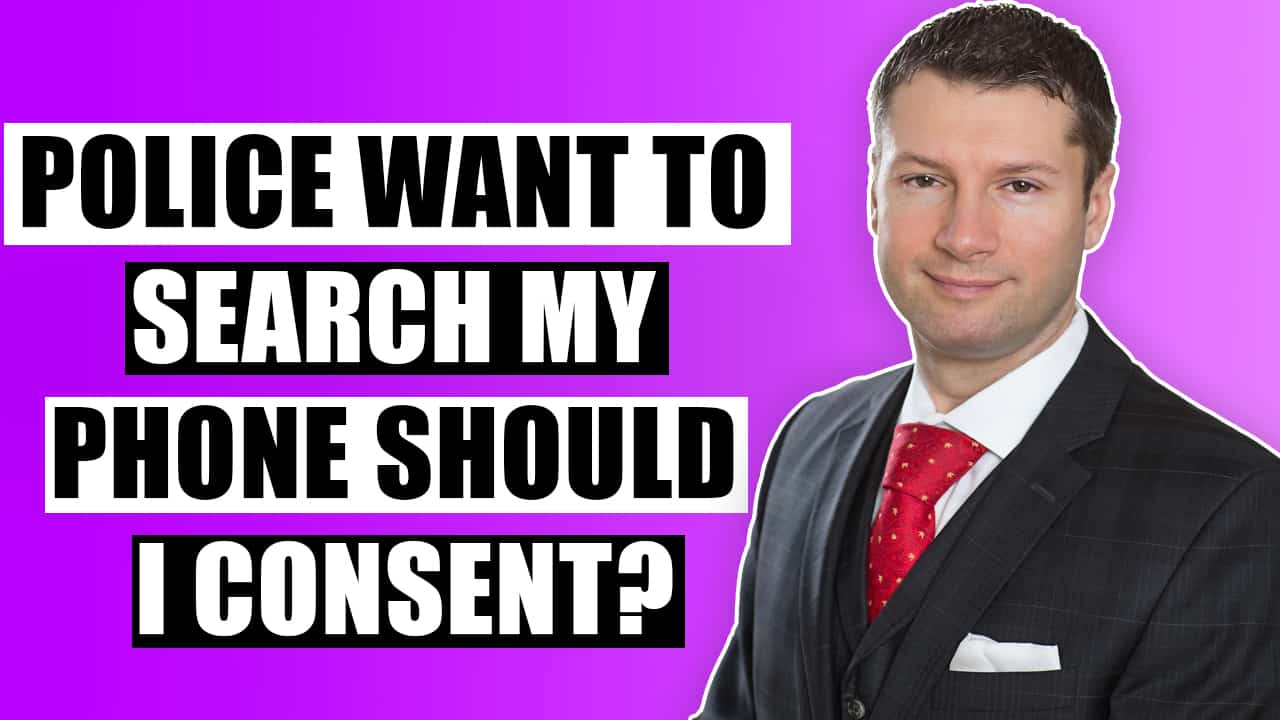
“Police want to search my phone, should I consent?” That’s a question that I get on calls where somebody’s been arrested and maybe they’ve been released from jail, and the police are holding their phone. They want to know, “Hey, police called me up or they came to see me and they just want to search my phone. I want my cell phone back. They told me that if I consent to a search and give them the code and all that, then I’ll get the phone back much faster.” It’s true to a degree, but other times it’s a tactic by law enforcement.
Here’s the Deal
As a suspect in a criminal case, you’ve got a reasonable expectation of privacy over your cell phone. And because of that, law enforcement generally needs to get a search warrant to search your cell phone, unless you consent.
So they’ll ask you for your code to get on your phone, which you do not have to give them. And they’ll ask you for consent to search your phone. Usually, they don’t even limit the scope of that consent. For example, they don’t say, “We just want to look through your pictures that you took the last day.” When they ask you for consent to search your phone, most often they’ll search your entire phone. What people don’t understand always is that there may be evidence of a crime or even suspicious evidence of potential crime on your phone going back months, years, whatever. They can uncover things that you didn’t even think of necessarily.
“I Don’t Have Anything to Hide, Should I Just Show Them?”
That depends. You’re going to want to talk to a lawyer about your unique circumstances under the situation. Generally speaking, the safe play is to make them get a warrant. That’s because — here’s how the law works – when they ask you to search your phone, and if you give consent, your whole phone, generally speaking, is fair game for them. So they can get evidence not only of what they suspect as potential evidence of a crime that they’ve arrested you for that they’re investigating you for, but like I said, they can go back a long time and uncover something that you may forget that’s on your phone, or that might be suspicious or incriminating.
Sometimes they get it wrong. Remember, the legal process isn’t perfect. You’ve all heard about times where someone was completely innocent of a crime, they went to trial, they were found guilty by 12 unanimous jurors who all said, “You’re guilty beyond a reasonable doubt.” And then 20 years later, we find out that DNA sets them free. They’ve been sitting in prison for 20 years for a crime they really never committed. So that whole idea of, “Well, wait a minute, I’ve got nothing to hide. I should just give them this.” Remember, the process is not perfect, and innocent people really do get convicted of crimes they never committed. That’s a travesty, and we strive to make sure that doesn’t happen. But because it’s a human process, it’s never going to be perfect, and you’re at risk if you’re under investigation for a crime, even if you didn’t commit it.
Always say, “No, You Need a Search Warrant”
The alternative is to respectfully say, “No, you need to get a search warrant.” If you say that, then you’ve got automatic protection under the Fourth Amendment as well. And then a judge has to look at an application from a police officer and determine whether there’s probable cause to search your phone. Sometimes they’ll say, “No, I’m not going to give you a search warrant.” Then it’s over, and they can’t use your phone against you. Other times they’ll issue a search warrant but they’ll curtail it, and they’ll say, “You can only go back a one week worth of messages, or you can only go into their Instagram file, if they were talking by Instagram. You can’t go into their photos. You can’t go into their text messages. You can’t go into their email.” So a judge can sometimes limit the scope and the places and the duration of time that an officer can look at your phone.
Other times, the judge will rubber-stamp a really broad application for a search warrant. They’ll go through everything, and they’ll recover things that you thought were deleted, and that’s really dangerous sometimes. So, for that reason, when those judges will rubber stamp things, that’s a bad search warrant. So what happens? Well, you might think, “Well, wait, if a judge gave a search warrant, then aren’t I out of challenges anyway?” No. First of all, they got to overcome that first hurdle and get a search warrant from a judge. Some judges will put the kibosh on it and say, “There’s no probable cause there.” Even if a judge issues a search warrant, then you still might be able to suppress some things if they search beyond what they were supposed to be able to look for in the search warrant. Or, sometimes the search warrant itself was just inappropriate and you can get the whole search of the phone thrown out.
Recent Case
I had this situation in a case where law enforcement really should have only been going back a couple of days in a phone. Instead, law enforcement ran way back and charge the guy with evidence of a potential crime from months and months before that, where they really should have never even been able to look there based on the information they had. I attacked that search warrant for the client. We had a suppression hearing about it, and one where another judge agreed with our argument that this was a really inappropriate search warrant. It was over-broad. There was no basis to go through the entire phone. We got all that evidence thrown out, and as a result, the guy’s charges were thrown out in a case as well.
So, take it safe. Usually, you can politely say, “Listen… ” I know it’s a trade-off. You’re not going to be able to get your phone back right away, that’s the downside, but you’re trying to protect your future here. In fact, I think that’s what most law enforcement would do if they were ever accused of a crime, they’d invoke their rights and make the process work for them. You’ve got constitutional rights for a reason, use those to protect yourself. You’re usually in a much better place if you do that.
If you have more questions about cell phone searches in a criminal case, I’m a criminal defense attorney, Ryan Pacyga. You can find me at arrestedmn.com or call me at 612-474-5420.

